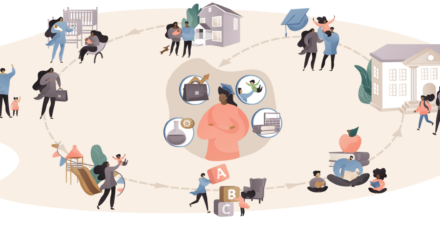A growing body of evidence shows that investments in high-quality, affordable, and accessible childcare and learning are a key element of a healthy, growing U.S. economy. Research tells us that the ages zero to three are a critically important time for developing the wide range of skills necessary for future success. Equitable Growth is growing the evidence base for the demand side of the early education equation—what do families need and want for their children and themselves and what are the obstacles to access across the economic distribution—and the supply side of the equation—what does quality childcare look like, and how do we expand access to quality early care and learning jobs in a way that creates meaningful economic security for care workers?
Featured work
Child care prices, inflation, and the end of federal pandemic-era aid in five charts
May 8, 2023
May 8, 2023
What is social infrastructure, and how does it support economic growth in the United States?
January 26, 2023
January 26, 2023
Factsheet: What the research says about the economics of the 2021 enhanced Child Tax Credit
November 29, 2022
November 29, 2022
Advancing research and evidence on child care and U.S. economic growth
November 10, 2022
November 10, 2022
Factsheet: What the research says about the economics of early care and education
September 15, 2021
September 15, 2021
Explore Content in Childcare & Early Education215
Is COVID-19 Exacerbating Inequities in Subsidized Child Care?: Policy Lessons to Strengthen the Home-Based Sector
August 27, 2021
August 27, 2021
Voices of Home-Based Providers: Perspectives from the Early Childhood Field
August 27, 2021
August 27, 2021
The economic benefits of equal opportunity in the United States by ending racial, ethnic, and gender disparities
June 29, 2021
June 29, 2021
Expert Focus: Examining and strengthening U.S. care infrastructure
April 27, 2021
April 27, 2021
Factsheet: What does the research say about care infrastructure?
April 15, 2021
April 15, 2021
Roads, bridges, bottles, and blocks: Rethinking infrastructure for the post-pandemic U.S. economy
April 12, 2021
April 12, 2021
Expert Focus: Supporting women’s labor force participation to boost U.S. economic growth and recovery
March 29, 2021
March 29, 2021
Women’s History Month: Systemic gender discrimination continues to harm working women amid the coronavirus recession
March 12, 2021
March 12, 2021
Public investments in social insurance, education, and child care can overcome market failures to promote family and economic well-being
January 14, 2021
January 14, 2021
COVID-19 and Paid Leave: Assessing the Impact of the FFCRA
January 4, 2021
January 4, 2021
Access to Paid Leave during the Covid-19 Pandemic: Evidence from NYC
January 4, 2021
January 4, 2021
Explore the Equitable Growth network of experts around the country and get answers to today's most pressing questions!













